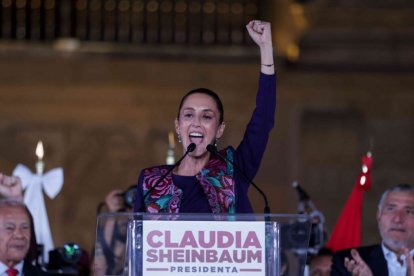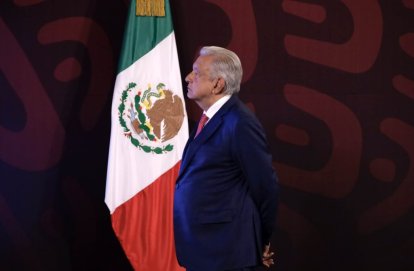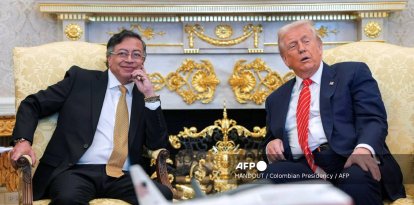Mexico, on the verge of authoritarianism like never before after the triumph of Claudia Sheinbaum
With both houses of Congress under its power, the Government of Mexico now has carte blanche to do and undo.

Mexican President Andres Manuel Lopez Obrador (L) listens to Mexico City Mayor Claudia Sheinbaum during a press conference in Mexico City on January 20, 2023. The president gave details of the twelve people arrested who were involved in the failed attack on Mexican journalist Ciro Gomez Leyva on December 15, 2022. (Photo by ALFREDO ESTRELLA / AFP)
After the resounding victory this Sunday in the federal elections of the ruling coalition, Mexico is approaching a fully authoritarian system like never before. Although outgoing, President Andrés Manuel López Obrador achieved a concentration of power that the immense North American country had never experienced in its democratic era. The danger is real.
Claudia Sheinbaum, the one chosen by López Obrador to succeed him, prevailed over the opponent Xóchitl Gálvez with the impressive percentage of 59.35%, compared to 27.9%. Gálvez was humiliated despite going to the elections with the protection of a coalition formed by the traditional parties National Action Party (PAN), the Institutional Revolutionary Party (PRI) and the Party of the Democratic Revolution (PRD). It was an unprecedented event.
As my friend Juan P. Villasmil wrote in The Spectator, it's as if "an independent Bernie Sanders or Donald Trump beat a coalition made up of Republicans and Democrats."
In this way, the Government, based on its National Regeneration Movement party (Morena), It changed the political landscape of Mexico forever. And thus, too, began a new and dark era for the Latin American power.
Added to Sheinbaum's victory, Morena, together with its allies the PT and the PVEM, could achieve a qualified majority in both chambers of Congress. The projection, according to the quick count, is that in the Chamber of Deputies the Government coalition would achieve between 346 and 380 seats. For the qualified majority you would need 334.
As for the Senate, López Obrador's bloc would have between 76 and 88 seats. You need at least 85 senators.
If Congress, plus the Presidency, wins, the Government would practically have carte blanche to do and undo. The future is uncertain, but López Obrador's last six years could offer us a glimpse.

Claudia Sheinbaum after declaring herself the winner of the federal elections in Mexico, this June 3. (Xinhua/Francisco Cañedo)
"The six years of destruction"
Andrés Manuel López Obrador is a difficult politician to describe. Although with leftist rhetoric and profound social policies, the great stain on his time in Government was the security problems.
Under the slogan of "hugs, not bullets," López Obrador came to power in 2018 with the promise of pacifying a Mexico that suffered from the rampant control of territories by drug trafficking cartels. But everything got worse. Under his government it is estimated that more than 200 thousand people were murdered, more than 30 thousand a year. Also, tens of thousands disappeared without a trace.
According to studies, cartels control a third of all of Mexico. They have imposed terror. In the regions where they operate, the State does not exist. Businessmen, merchants and security submit to the cocaine lords.
"The six years of López Obrador's presidency have been the most violent in Mexico's modern history. We cannot know the exact number of those murdered, because López Obrador destroyed the independence of the national statistics agency. Today, crime figures are often manipulated for political purposes," reads an extensive article written by David Frum for The Atlantic.
"The majority of murders in Mexico are not the result of personal disputes or casual street violence," Frum continues, "Mexico is being attacked by what has been aptly called a 'criminal insurgency.'"
In fact, in March of last year, during a Senate hearing, United States Secretary of State Anthony Blinken said that drug cartels are in control of parts of Mexico after expelling the Government.
Ian Vásquez and Daniel Raisbeck write in an article for the Cato Institute that "cartels control a third of the country. In addition to drug trafficking, they are dedicated to human trafficking and extortion of small and large companies throughout Mexico. To protect their territory, criminal organizations have launched a wave of political violence."
But for López Obrador this has not been a problem. The apathy towards the increase in crime and the power of the cartels, plus their condescension towards criminals, suggests that the current state of things is part of Morena's policy. Frum says in The Atlantic that "López Obrador's relationship with the cartels is murky."
"An internal DEA investigation suggested that criminal cartels had likely directed donations worth $2 million to López Obrador's first campaign for president, in 2006," Frum writes.
"There is no denying that López Obrador maintains close personal relationships with major traffickers. In 2020, he visited a dusty mountain town in Sinaloa to pay his respects to the mother of notorious drug lord El Chapo Guzmán."
And, equally disturbing, has been López Obrador's relationship with the institutions. Since coming to power, the president considered reforming the State to, according to him, cure the vices of the public powers. One of the main targets of his attacks has been the independent National Electoral Institute, which controls the elections in the country, which he has wanted to subordinate to the Executive.
Since he has not been able to completely dominate it, Lopez Obrador decided to hang it: he reduced its budget, personnel and authority.
Another of the institutions that López Obrador has in his sights is the Supreme Court, which he intends to alter. Its purpose is for judges to be appointed by their supporters, in a popular election.
In 2021, Mexico prevented López Obrador from reforming the State at his convenience when the Government lost its majority in Congress. So, the independence of the Mexican central bank was maintained, as well as that of other institutions. However, what he did not achieve during his term could happen soon. And, to fulfill the plan, Mexicans voted for a woman without charisma, unpopular and malleable, but who López Obrador chose as his successor. Claudia Sheinbaum arrives at the National Palace to strictly follow Morena's script.

A López Obrador supporter holds masks of the president and President-elect Sheinbaum in Mexico's Zócalo, June 2. (Photo by Pedro Pardo / AFP)
López Obrador through Sheinbaum
"López Obrador came to power in 2018 with a huge mandate that he won in a free and fair election. Sheinbaum comes to power through an election that was free, but not so fair. Since she lacks López Obrador's charisma and popular appeal, her survival will depend on whether she can tilt the rules even more radically in favor of the ruling party," the Atlantic reads.
The writer David Frum explains in his article that, "of the three candidates of the Government party who were competing for the support of López Obrador, Sheinbaum was the one with the fewest and weakest followers among the Morena bases."
"The choice of Sheinbaum was not because López Obrador was looking for someone who would break the mold, but rather he wanted someone he could control after his forced departure from power at the end of a six-year term," adds Frum.
López Obrador even created a mechanism in which he established that the ruler must be subjected to a recall referendum three years into his mandate. When he called it, in 2022, it seemed that he was taking a risk, but he had everything calculated: he received 91% support, although abstention was very high. However, that figure served to legitimize itself. Now, considering that he is the popular one, it works as an extortion tool for Sheinbaum: if López Obrador's successor disappoints him, his supporters will collect it after three years.
A state made to measure
"A more politically authoritarian future awaits Mexico, much more centralized in the presidential figure. A future where more and more decisions are made from the offices of the National Palace based on political criteria, instead of being taken in autonomous institutions based on technical criteria," writer and political analyst Gerardo Garibay told Voz Media.
For Garibay, who lives in Mexico City, it is "inevitable" that a Sheinbaum government will lead to "the consolidation of political authoritarianism and government centralization."
If the qualified majority is consolidated in both chambers of Congress, Garibay says that Sheinbaum "could do whatever she wants."
For the analyst, the president-elect would seek to reform the Constitution, in addition to continuing with López Obrador's reformist project, which would allow the Government "practically absolute control over institutional life, a scenario where really the only relevant conflict is going to be inside Morena itself."
"The opposition parties are going to become decorative figures," adds Garibay.
An element that also marked López Obrador's Presidency was the persecution and harassment of the free press. In his popular morning statements, the president's hour-long statements, journalists were constantly exposed and attacked. In fact, David Frum says in his article for The Atlantic that "journalists, in particular, live or die depending on whether criminal syndicates believe they are protected by the state."
Frum recalls the case "of a prominent Mexican television personality who narrowly escaped death when his car was riddled with bullets after the president denounced him at his daily press conference."
Probably, analysts agree, President-elect Sheinbaum will maintain or accentuate tensions with the press.
For Alice Galván, lawyer and president of the influential Mexican foundation Patria Unida, the Government will now be able to approve all the constitutional reforms "that López Obrador had yet to approve."
And also, the president of Patria Unida remembers an important detail: Congress takes office on September 1st of this year, while the president is sworn in on October 1st. That is to say, there will be a month where López Obrador will have a completely subordinate Congress at his mercy. A Carte blanche. For Galván, what is coming for Mexico, at least, is that "the Government will seek to have judges elected through popular vote, it will weaken the autonomy of the Electoral Court and it will end up destroying the National Electoral Institute."
"What other important thing can it reform? It is going to do away with all the autonomous constitutional bodies that it could not during the last three years because it did not have a majority in Congress," he adds.

López Obrador during his morning press conferences, this April 29. (Photo by Luis Barron/ Eyepix Group/Sipa USA)
A controlled town. A messiah.
Why is a president who has plunged his country into unprecedented violence yet so popular? For Alice Galván, there were several determining factors that explain the impressive victory of López Obrador's appointee in the federal elections on June 2.
"It was a vote for López Obrador. We always said that it was impossible for the opposition to win due to three fundamental factors. The first, because The Government has bought the country. There are more than 30 million Mexicans who depend on social programs. The Government directly deposits 3 thousand Mexican pesos into their accounts monthly. What the Government had to do was make sure that the beneficiaries of its social programs voted," says Galván.
As a second factor, the lawyer mentions organized crime as a determining element: "They are allies. They have agreed. Organized crime decided who could be candidates in many states, in many municipalities. "They killed many candidates."
In fact, there were more than 30 candidates murdered, most of them from the opposition. A candidate for mayor of the state of Guerrero was murdered in front of cameras. Hundreds more have faced threats or been kidnapped.
"They threatened them. They told them: either you let Morena win or we will mess with your children. Depending on the territory, what the cartels and crime asked were done," says Galván.
A third factor is that, since assuming the Presidency, López Obrador has been gaining political ground and presence in the country. Of Mexico's 32 states, Morena governs 23, which allows it "political, territorial, economic and social control."
"He is a president who in five years managed to have control of more than 80 million Mexicans at the local level. Competing against that was very complicated," says Galván.
In his text for The Atlantic, Frum says that "the electoral victory that López Obrador granted to his successor concentrates more power in López Obrador's Morena party than any other Mexican government has exercised since the times of the single-party regime."
Mexicans decided to reward a disastrous government with absolute power. There are the reasons that Alice Galván lists. Gerardo Garibay agrees and adds that even today Mexican voters maintain their frustration with traditional politics. It is precisely for this reason that, despite being in coalition, the historic parties the PAN, PRI and PRD suffered a humiliating defeat.
Mexico enters, then, from a lethal cocktail, composed of voter frustration, the intimidation of organized crime and an unequal campaign thanks to State resources, in an uncertain stage, where all scenarios guarantee dark days ahead.
"What do we have left?" political analyst and comedian Brozo asked on a Mexican television channel this week. "We have to resist. We have to keep thinking and keep feeling."
"It is the end of democracy in Mexico," Brozo said.

























